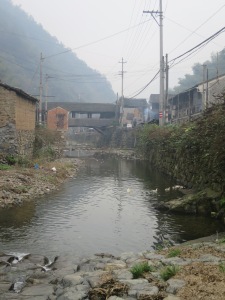Daily Archives: December 14, 2014
Keeping clean: rural and urban perspectives
Following our trip to Yona, my Chinese teacher’s, village wedding, I’ve engaged in more conversations with her about what life was like there as a young girl growing up. Yona is unreservedly positive about her childhood, despite its hardships. She enjoyed the freedom of playing in the stream and the forests, even if she had to cycle to primary school in a neighbouring village, starting out in winter in the dark before 7am and sometimes crashing into the bamboo at the side of the road. Her grandmother’s house of course had no heating, but Yona remembers the portable bucket fires still prevalent in rural China with nostalgia. She described something like a hot water bottle which she assured me kept her warm all night.
Personal hygiene was a whole other story. Once a week she also cycled to another village for a shower in the public bathhouse. The public toilets which I’d found difficult because of their lack of privacy – no individual cubicles – are apparently a great improvement on ten years ago. Then the toilet block opened straight onto the street, and passers-by greeted you while you excreted or urinated. At least now the entrance faces away from the street. But what fascinated me was the fact that Yona’s grandmother still doesn’t have a bathroom in her house. She could have one, but prefers to use the public toilets. In the same way she has not installed a bottled-gas hob, preferring to cook using an open fire. She doesn’t want to live in Ningbo with her son, as is the custom, and considers city life to be utterly boring. Nevertheless, she may soon have to move as the authorities have deemed the village unsafe and have decided to close it down.
Another reason for not wanting to live in the city is the deteriorating environment, caused by the relentless construction of new buildings and the plethora of local factories. Although we have two bathrooms, access to hot water, electric heaters and other home comforts, the air we breathe is dirty, and I can quite understand why Yona’s grandmother might like to stay in her mountain village.
When I was in the sixth form back in the 1960s I remember my geography teacher describing how she used to sweep the soot off her front step in Sheffield, before the 1956 Clean Air Act. I don’t remember the word ‘pollution’ ever being used, and I certainly couldn’t have known that 45 years later I’d be experiencing a similar phenomenon.
I’ve never thought so much about cleaning as I do here. It is a daily battle to fight off the fine layer of grey brown dirt which coats every surface. The contents of our small vacuum cleaner look as though we actually live in the nearby construction site and we’ve already had to ask Alice to buy new filters for the vacuum from Taobao. Our windows always look dirty, despite regular cleaning, and the expandable bars for hanging out washing need to be wiped down repeatedly. I’ve begun to doubt the wisdom of hanging washing outside as clothes must come in dirtier than they went out.
We have recently been overtaken by fits of violent sneezing and coughing, especially at night or in the early morning. The symptoms are close to hayfever. It seems that after two and a half years our systems no longer have any resistance to the relentlessly dirty air and I’d begun to fear that I would permanently damage my eyes. So last weekend we decided to buy one of the many types of domestic electric air purifiers available in Metro.
One of the many non-jobs to be found in Ningbo is carried out by the man in uniform who waits by the exit of Metro, ready to stamp the invoice issued at the checkout. The man is invariably friendly and looking for a chat and we provided amusement for him when we tested our newly bought air purifier, just near the exit. Metro provides a ‘test platform’ to allow you to make sure that electrical appliances operate before you take them out of the shop.
‘What is this?’ asked Invoice Stamp Man, as we struggled with the box. One of the first words I learned in Chinese was ‘pollution’ and I was able to construct some kind of explanation along the lines of ‘make the air clean’. ISM looked sceptical to put it mildly and if he’d seen the price – around 2,500 RMB or £250 (probably around one third of his annual salary) he would doubtless have thought foreigners were truly mad. But perhaps he too remembered his village childhood where conditions may have been harsh, but at least you didn’t need to worry about the air you breathed.


